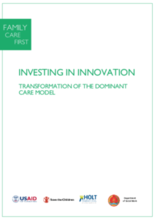Family Care First (FCF) is a United States Agency for International Development (USAID) supported project with the goal of making lasting improvements in the well-being of Cambodia’s children. FCF assists children outside of family care or those at risk of losing family care. It seeks to prevent unnecessary separation of children from their families and enable children to be placed in appropriate family care. FCF is led by Save the Children with multiple implementers.
As the Cambodian Ministry of Social Affairs, Veterans and Youth Rehabilitation (MoSVY) plans to reduce the number of children within institutions by 30 percent in just 3 years move forward, an estimated 3,500 children will require reintegration and alternative family care services in the coming years. Of that figure, approximately one in seven children will need kinship and foster care services. However, major stakeholders (USAID, MoSVY, etc.) have expressed concern over the lack of alternative care options in the country to accommodate the children leaving Residential Care Institutions (RCIs).
Action 3: Investing in Innovation, one of the projects of FCF, has supported the study and documentation of existing reintegration and alternative family care services in Cambodia, which are provided by civil society organizations (CSOs) throughout Cambodia. These services include: reintegration services to family, kinship care; long and short-term foster care; and semi-independent supported living situations. This action was designed to build the capacity of existing service providers to take emerging good practice to scale as an increased number of RCIs transition.
The key findings of this study and documentation suggest that permanency of care provides a greater sense of belonging and independence for children. In addition, the best alternative care for children is usually family or kinship care. It has also found that different types of care were not clearly defined or consistently used and care options were not always available when needed. There is a significant gap to meet the needs of children and families. The findings also suggested some recommendations regarding partnership, care models, case management, specialized services and further research, monitoring and evaluation.
Read the two-page research brief here.

